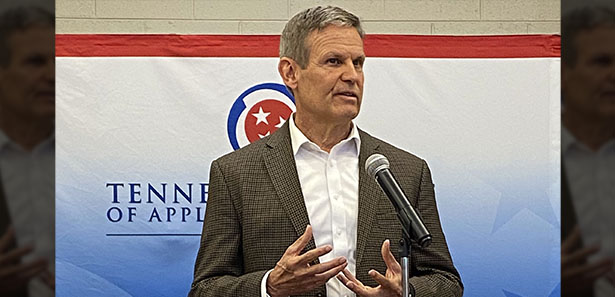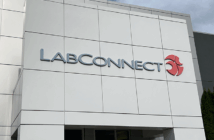Above: Tennessee Governor Bill Lee speaks at the Elizabethton/Carter County Legislative Breakfast, which was held at the Elizabethton TCAT campus last Friday morning. Photo by Dave Ongie
By Dave Ongie, News Editor
When Tennessee Governor Bill Lee took his turn at the podium during the Elizabethton/Carter County Legislative Breakfast last Friday, his message was loud and clear. A new day has dawned in the state, and the time has come to move forward into the post-pandemic world.
“We are beyond the health crisis in this state,” Lee told reporters following his remarks to local business leaders. “We don’t have a health crisis anymore.”
Lee’s comments about the COVID-19 pandemic – which shut down all non-essential business for a period last spring and served as a headwind against economic growth in the state well into this year – came in the form of a postmortem. Lee reflected on the decision-making process in the early days of the pandemic and explained why Tennessee was one of the first states to reopen businesses.
“We had very little information,” Lee said. “We had a lot of projections, a lot of ideas of what might happen. So we made decisions based on the information we had, which was very ominous at the time. But as you continue to receive information, you adjust your decisions.
“As we realized that what was projected to happen wasn’t really happening, then we had to quickly make adjustments in what we were doing. I don’t regret that process, but certainly now we realize shutdowns did not work. They were not the answer.
Lee praised the role that vaccines have made in helping Tennessee turn the corner in the battle to contain the pandemic. He referenced a public-service campaign the state has rolled out to help improve vaccine uptake across the state, but maintained the decision on whether or not to get vaccinated ultimately lies with each individual.
“Every person has to make that decision on their own,” Lee said. “We don’t mandate vaccinations and we don’t believe vaccinations should be mandated, but we do understand the absolute importance of it. It’s made all the difference.”
Lee is well aware that the pandemic has changed the way people will do business moving forward. Telehealth, remote learning and working from home have all become part of our daily lives over the past year, and will remain so in some form or fashion moving forward.
The freedom to work remotely has opened up an opportunity for rural counties to retain their best and brightest while attracting young professionals who may want to live in a less populated area while working for an employer in a larger metropolitan area. With that in mind, Lee touted the $100 million investment that has been made this year in expanding broadband access in rural areas.
“I’ve said for years that what happens in rural Tennessee matters to every Tennessean,” Lee said. “It’s great to have prosperous economic activity in our big cities, but what is important is that the rural economies move forward at the same time.
“People need to be able to access healthcare, remote education, and be able to work from home or remote locations.”
A visit to the Elizabethton Tennessee College of Applied Technology campus – the venue for the breakfast – would not have been complete without Lee reaffirming his commitment to vocational education and the development of the next generation of skilled tradespeople. Lee pointed out that more than $100 million is being invested this year into colleges of applied technology and workforce development in Tennessee.
Moving forward, Lee said getting Tennesseans back to work is a high priority. Earlier in the week, Lee had announced his intention to end all federally funded unemployment compensation programs in the state by July 3, a move he said is designed to help fill the 250,000 jobs that are currently unfilled.
“Our economy is back to pre-pandemic levels,” Lee said. “We need to get our businesses back to normal and move forward with that. In order to do that, we need to create pathways for folks to go from unemployment to the vast amount of employment that’s available in our state.”




